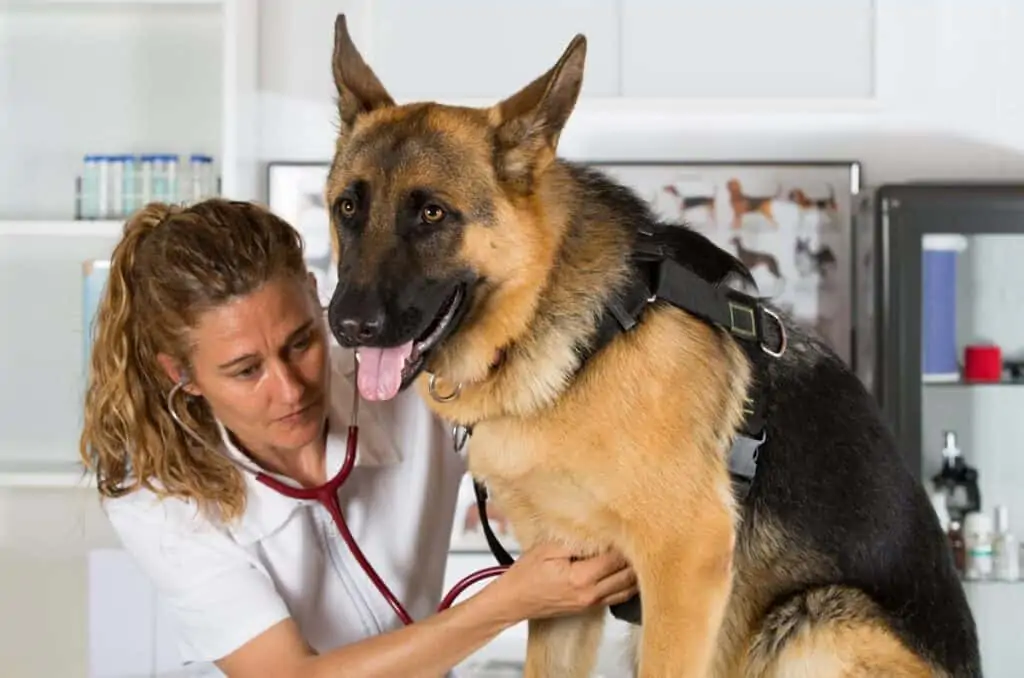Dog Kidney Failure When to Euthanize
Canine kidney failure, also referred to as renal failure or kidney disease, is when the kidneys don’t release toxins that come out in the dog’s urine or feces. Healthy kidneys help the body hydrate, preserve electrolytes, and produce red blood cells.
The main function kidneys are responsible for is getting rid of toxins, which helps the body get rid of pollutants, processed junk food, heavy metals, and other chemicals. Without the ability to rid toxins, your dog will become very ill.

Most dogs can survive through much of the process of the diagnosed disease. However, their quality of life significantly decreases. The number one question most dog owners ask is “when do I euthanize my dog if they test positive for kidney failure?”
While there are things you can do before euthanization, your vet will recommend advice for the best care, leaving euthanization as the last resort. In this article, you’ll learn about dog kidney failure and when to euthanize your beloved pet.
Disclaimer: I am not a Vet. I am not, you are probably also not. Your Vet IS the best qualified and will provide the most tailored and best advice for your specific situation.
What Is Kidney Failure in Dogs?
Kidney disease or “renal” failure occurs when the kidneys stop working effectively to clear toxins from the body. Kidney failure affects 1 in 10 dogs and it becomes more common with old age. One of the first initial signs of your dog’s struggle with kidney failure is lethargy and lack of appetite, as kidney failure contributes to severe dehydration.
Don’t get confused with the idea that kidney disease means your dog cannot control its bladder or bowel movements. While dogs with renal failure can still urinate and defecate, their body is unable to filter the blood of waste products.
Essentially, your dog will urinate but won’t be able to eliminate the toxins in their body, which means that toxins will build up and make your dog very unwell.

Cause of Kidney Failure in Dogs
As your dog ages into its senior years, parts of its body and organs shut down. In most cases, old age isn’t a cause for concern. A dog with kidney failure is at an increased risk of poor quality of life.
Some of the leading causes resulting in canine kidney failure are:
- Glomerulonephritis
- Pyelonephritis – Infection of the kidneys
- Nephrolithiasis – Kidney stones
- Ureteral obstruction – inability to get rid of stones that cause blockages
- Leptospirosis
- Hereditary diseases
- Amyloidosis – Protein disorder
The most common dog breeds that inherit kidney disease or renal failure are Bull Terriers, German Shepherds, and English Cocker Spaniels.

Symptoms of Dog Kidney Failure
Since one of the early symptoms of kidney disease causes severe dehydration, you may notice your dog drinking large amounts of water alongside outputting massive volumes of urine. Other early symptoms of canine kidney failure include general weakness and depression.
When kidney failure has progressed into the later stages, you’ll notice:
- Blood in the urine
- Lethargy
- Mouth ulcers
- Intestinal seizures
- Rapid weight loss
- Decrease in appetite
- Chemical smelling breath
- Nausea and vomiting
- Pale gums
It is imperative to get your dog to a vet as soon as you notice beginning symptoms of renal failure. The earlier treatment can undergo, the better for your dog. However, depending on treatment and the time of diagnosis, kidney failure will progress from a few weeks to a few years.

How Is a Dog Diagnosed With Kidney Failure?
Some of the main things your vet will look for upon examination is dry gums which signifies dehydration following a full bladder. Your vet will get a urine test and may do a rectal exam to see if there are any other complications before making a final diagnosis.
Other tests your dog will undergo include:
- Complete blood count – Checks for signs of anemia blood parasites and measures the ratio between white blood cells to red blood cells. Blood work will also determine whether your dog has parasites, infection, or inflammation.
- Electrolyte chemistry profile
- Urinalysis – Checks the measurement ratio between creatine and protein.
- Ultrasound, X-rays, and diagnostic imaging
- Kidney sample
- Blood pressure
If your pet is diagnosed with kidney failure, your vet will let you know at what stage the kidney disease has progressed and what the correct type of treatment is at that stage. The diagnosis will give your vet a clear view of the prognosis.

Treatment Options
Your vet may prescribe medication, such as a potassium supplement or a high-blood-pressure medication.
The primary treatment includes:
- Keeping a well-balanced diet.
- Supplying plenty of fresh water throughout the day.
- Balancing salts and acid-base levels.
For the most part, treatment is closely related to your dog’s diet. Although, take note of the fact that kidney failure is not a curable disease. So, it is your job to keep your dog on a strict diet until it’s time to euthanize.
Diet for Dog Kidney Failure
The best thing you can do for your furry companion is changing their diet to a kidney-friendly diet. Your vet will recommend a diet that includes:
- Omega-3 fatty acids – Provide anti-inflammatory relief
- Low sodium and phosphorus – Slows down the progression
- High vitamin B and C – Replenishes lost vitamins and increases appetite.
- Cranberry powder – An antioxidant essential for pain reduction and kidney function.

When to Put a Dog Down with Kidney Failure?
Some dogs will live years after being diagnosed with kidney disease and failure. However, others are not-so-lucky. As much as any owner doesn’t want to see their dog suffer, the best thing you can do is make your dog comfortable until it’s time to euthanize.
A prognosis is made depending on the severity and stage of the disease. Although your dog will be attending weekly to monthly checkups, the late signs of kidney disease include:
- Depression
- Whining from pain
- Little to no energy
- Little to no drive for life
- Excessive sleep
Noticing any of the above signs means a scheduled appointment with your vet. Please take comfort in knowing that you were there for your dog all the way through and did everything in your power to keep them healthy.

Summary
For the most part, dogs rarely feel any pain regarding kidney failure. Aside from pain, your dog will feel uncomfortable with the progression of symptoms and the regular poking and prodding associated with vet visits.
When it comes to dog kidney failure and when to euthanize, take the time to spend quality time with your dog. Kidney failure will not restrict their activity (until the later stages), so make an effort to continue daily exercise routines. The best way to make your dog comfortable is not changing their routine – just their food.
When it comes time to euthanize, you’ll be ready, and it is a memory you’ll take with you forever.